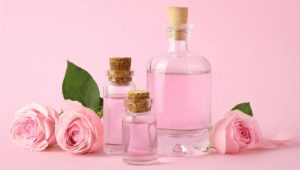Monsoons are already here! The humidity is already high, with increased sweat and oil secretions. An oily and sweaty skin attracts more dirt and chemical pollutants, leading to pimples and rashes. An acne condition can also get aggravated. In fact, fungal infections are also common. If an infection is severe and causes itching or pain, consult a doctor without delay.
Daily cleansing and skin care, with appropriate products, is important. The pores must be kept unclogged and oiliness of the skin must be reduced. Use a face wash containing ingredients like tulsi and neem. Apply a skin tonic after cleansing, using cotton wool. Skin fresheners and tonics play a crucial role in the skin care routine, especially in hot and humid conditions. They restore the normal balances, stimulate blood circulation and add a glow.

Rosewater is one of the best known skin toners. For oily skin, buy an astringent lotion and mix it with rose water in equal quantities. Keep in the fridge, chilled and ready for use. Night-time cleansing is a must, to remove sweat and oil deposits, make-up, pollutants and impurities that have been deposited on the skin during the day.
Apply a facial scrub twice a week. It removes dead cells and brightens the skin. It also helps to discourage and dislodge blackheads. Apply on the face and rub gently on the skin with small circular movements. Leave on for 5 minutes and wash off with water. This can be done after cleansing in the morning. Stubborn blackheads can be removed at a skin-care clinic, by a trained therapist. Pinching blackheads with the nails leads to infection and scarring. Avoid touching the face without washing your hands and never pick or pinch blackheads and pimples. If the skin is oily, avoid the use of oily creams and moisturizers. Look for a matte moisturizer or sandalwood protective cream. Carry wet tissues in your handbag during the day to wipe and refresh the skin. Then powder compact may be applied.
Pay special attention to the feet. Fungal infections can lead to Athlete’s Foot. After washing them well, dry them thoroughly and apply talcum powder. During hot and humid weather, wear open footwear, so that the sweat evaporates. This helps to avoid fungal infections like athlete’s foot and ring worm, which grow on moist skin. Cleanliness and hygiene also extend to your clothes. Sweat clings to clothes and leads to a stale and bad odour. Change your clothes daily, especially your underclothes. In summer, two changes of clothing are necessary. Wear cotton clothes during summer, so that the cool, porous material helps the perspiration to escape and evaporate.
Apple cider vinegar is said to help fungal infection. Mix the vinegar with water in equal quantities and apply on the affected area of the skin with cotton wool pads. Leave on for half an hour and then dry the area by patting with a clean towel.
For athlete’s foot or nail fungus, soak 4 black tea bags in four to five cups of boiling water. Allow it to cool and soak the feet in the tea-water. Tea Tree Oil can also be applied. Mix it with aloe vera gel or olive oil in equal quantities and apply on the affected area. Drink 6 to 8 glasses of water daily. Add the juice of a lemon to a glass of warm water and have it first thing in the morning.